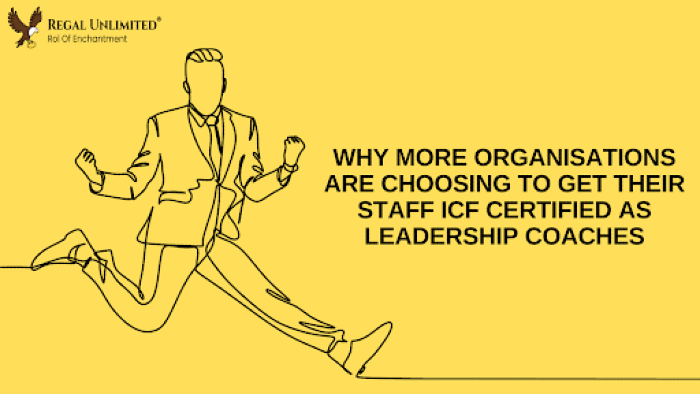“An army of sheep led by a lion can defeat an army of lions led by a sheep.”- African Proverb.
This proverb captures the essence of the importance of leadership. The Leader has the responsibility to steer the organization to achieve its objectives and targets. Change is the only constant. The leader must be well equipped to navigate the winds of change.
The future workplaces will have coaches and not bosses. As the leadership baton is handed over to Millennials and Gen-Z, the traditional autocratic leadership style will not work. Leadership and its style must be revamped to cater to the new reality. Coaching style of leadership is the answer.
Leaders, as coaches, will provide guidance and support while their team members learn to adapt to change thereby driving organizational growth on an entirely new horizon. Coaching leadership style is growing in success and relevance at workplaces. Coaching has become a necessity and is no more a luxurious choice for the leaders.
Why Does Coaching For Leaders Matter?
“Coaching is the future of leadership.”- Subash CV, Founder and Managing Partner, Regal Unlimited.
On a personal level, coaching for leaders-
● Increases Self-Awareness
● Builds Self-Confidence
● Works on Strengths
● Develops Communication Skills
On a professional level, coaching for leaders-
● Brings New Perspectives
● Builds Executive Presence
● Improves Business Performance
● Better Teamwork & Collaboration
Leadership Coaching not only maximizes the potential of the leader but also enables the organization to realize its potential.
The top 6 ways organizations can benefit from Leadership Coaching are:
1. Helps increase revenue/ margin
2. Develops the leadership pipeline to create able successors
3. Equips leaders for change management
4. Can reduce/ arrest attrition
5. Improves team performance
6. Helps set healthy company culture
The Leader’s Role as a Coach Is Critical For The Organization
“The greatest leader is not necessarily the one who does the greatest things. He is the one that gets the people to do the greatest things.”- Ronald Reagan.
The team is as important as the captain. If the leaders give the space to their team members, the team will be able to tap into their potential and achieve greater results. The role of a leader is undergoing great change. However the leader, as a coach, would have the responsibility to-
● Lead instead of managing teams and employees
● Maximize the team’s/organization’s potential and performance
● Stimulate innovation and growth
● Shape new leaders
Coaching leadership style helps unlock untapped potential and improve performance. You can read more about that on our dedicated blog.
To enable coaching leadership, one may enable with hiring an ICF credentialed coach to coach leaders to strengthen their personal and professional skills. Leaders can also become better at coaching by mastering the methods and discipline of coaching from these mentor coaches. This is vital towards creating the right capability in leaders.
However, it is also important to create a learning organization. All leaders must work as coaches for their team members. This helps develop an innovative culture in organizations that can deal with the rapid pace of change in the business environment and the customers’ fast evolving needs and demands. The innovative culture helps organizations build a competitive advantage.
One More Time – What Is Coaching?
Coaching leadership is the antidote to the traditional leadership style. The leader’s approach is the differentiating factor in the leadership styles
Autocratic leadership relies on top-down decision making. Coaching leadership style is infused with partnering, collaboration, guidance and support.
Coaching leadership style involves leaders providing assistance and direction as against commands and orders. Employees learn how to adapt to a rapidly changing environment in ways that spark vitality, ingenuity, and commitment.
Mentoring cannot be misconstrued as coaching. Mentoring involves an expert sharing knowledge with a less experienced team member. Although mentoring is valuable, it is not coaching. Coaching involves asking powerful questions that provoke insights and introspection in team members. Skillful coaching helps leaders, as coaches, to help their employees to reach into their untapped potential to maximize their performance.
What Prevents Leaders From Being Good Coaches
Change is not easy but it is unavoidable.
“To improve is to change; to be perfect is to change often.”- Winston Churchill
Some of the challenges that leaders face in their journey of becoming good coaches are:
1. Misunderstanding Coaching
Many leaders confuse coaching with mentoring, counseling, therapy et al. Coaching is none of that. The International Coaching Federation defines coaching as partnering with clients in a thought-provoking and creative process that inspires them to maximize their personal and professional potential.
This lack of understanding is one of the main reasons why leaders do not become good coaches.
2.Perception of Coaching to be tedious and uncomfortable
Leaders who are used to dealing with subdued performance by telling people what to do look at coaching as a very soft approach. “If you wish to know what a man is, place him in authority.”- Proverb
Commanding and direct people asserts authority which can be addicting. As coaching is not about asserting authority, rather partnering, many leaders may feel uncomfortable with coaching. This lack of comfort can lead to excuses like lack of time, lack of requirement, or team not being coachable et al. This assumption is further strengthened by research findings that have found that leaders usually rank coaching as their least favorite style of leadership.
3.Tendency to overestimate coaching skills
Many leaders tend to overestimate their own coaching effectiveness and ability. This was proven through a study where it was found that 24% of managers overestimated their skills and rated themselves above average while their team members ranked them in the bottom third. This is a huge discrepancy.
This proves that the coaching skills in managers are often worse than they think.
4.Coaching can be challenging
In a Leader As Coach program session, managers were asked to role-play a scene where a manager had to choose between firing and coaching an underperformer.
The plot-
The underperformer has made a mistake and the situation has been aggravated by some confusion caused by the manager by alternating between ignoring the employee or micromanaging him. 9 out of 10 managers want to fire him. The manager knows he must ask and listen and not tell and sell.
The conversation-
Manager: How do you think you are doing? (It is good to begin with an open-ended question)
Employee: I am doing good. (Unexpected answer)
Manager: Do you think there were any areas where you could have done better? (Paraphrases the question)
Employee: I think I did accomplish most of what I was expected to do (Again, not the expected answer, adding to the frustration)
Manager: Don’t you think your skills and talents are better suited to a different role than what you are doing now? (Asking leading questions)
Employee: No, I think I am in the right role. I like doing this job. (Getting defensive. Less likely to give the expected answer.)
Manager: Look, I think you are not delivering what is expected from a person in this role. I think you should look for an alternate role elsewhere. (This is telling; to get the message across)
There exists a misunderstanding between the manager and the employee. The manager believes that he put in his best and the employee is to blame. The employee feels that he is being singled out unfairly and does not understand why he is being treated so.
This conversation is an example of what is not coaching. There was no learning or growth as an outcome of this conversation. This scenario is a recurring event in organizations. This is why employees rate their managers poorly in coaching.
Organizations with such managers are adversely affected on multiple levels. Low levels of employee engagement, talent retention, creativity and innovation, and under-motivated underperforming employees lead to low customer satisfaction and underachievement of organizational goals.
Why is Leadership Coaching Important? The Keys Benefits
“One of the most important actions, things a leader can do, is to lead by example. If you want everyone else to be passionate, committed, dedicated, and motivated, you go first!”- Marshall Goldsmith
Leaders face a constantly challenging environment. They need to be best equipped to navigate the winds of change. 8 reasons why leadership coaching is important are-
To handle change and disruption more effectively
We live in uncertain times. The pandemic, the looming recession, the Russia-Ukraine War, and inflation pose multiple challenges to a business. A coaching mindset enables a leader, as a coach, to emerge as a more resilient, agile leader.
Your coaching mindset extends and creates a safe space for your employees to function at their full potential irrespective of the challenges and changes in the organization.
To enhance productivity
A research by Delotte reveals that organizations where senior leaders coach effectively have better business results, an increase of 21%, when compared to other organizations without coaching leadership style!
To improve collaboration
Leaders who coach inspire and motivate teams to resolve conflicts. This resolution enhances effective collaboration which gets teams to work towards common goals. Satya Nadella is a great example of how a coaching style of leadership was instrumental in transforming Microsoft’s competitive culture to a collaborative one.
To enhance problem-solving capabilities
Coaching transcends into a space of genuine curiosity and questioning that enables struggling teams to identify areas of concern and discover solutions. This path of self-discovery motivates teams to adopt corrective action and achieve excellence.
To embed a coaching culture in the organization
When the organization adopts a coaching leadership style, the coaching mindset percolates down and eventually becomes a part of the organization culture. TCS benefited from a coaching culture that helped them face challenges that came with the pandemic.
To achieve short-term and long-term goals
Leaders, as coaches, enable teams to achieve short-term and long-term goals effectively using the GROW Model. Achieving short-term goals regularly fuels the motivation to achieve long-term goals.
To adapt to the current workforce
The workforce is changing. As the leadership hands over the baton to the Millennials and Gen-Z, the traditional working style will not stick. Their motivations and aspirations are starkly different from their predecessors. They are seen to respond best to new-age leadership styles like the coaching leadership style.
To manage diversity
Leaders, as coaches, are perceived and are more empathic and inclusive while managing a diverse workforce. Coming back to the TCS example, the leaders began to respect different time zones which was seen as a direct result of adopting the coaching mindset.
How To Become a Better Coach?
There are a few strategies you can employ to become a better coach.
1. Hire ICF Credentialed Trained Coaches to experience Leadership Coaching
2. Get an ICF certification and credential
3. Continuously educate yourself by reading more books and attending webinars
You can read our blog on why leaders should consider becoming coaches for further details.
How Can Regal Unlimited Help Good Leaders Become Coaches?
Leader As Coach Program- Our Leader As Coach program is an in-house curated premier leadership program that is based on the ICF and EMCC frameworks that helps embed a coaching culture in the organization. The LAC program has empowered more than 1000 leaders to add coaching to their skill set.
These leaders, as coaches, have inspired and motivated their teams and transformed the fortunes of their organizations.
You can read more about our Leader As Coach program here.
ICF Certification and Credentialing- Get an ICF certification and credential with us. Regal Unlimited is an ICF certified coach training institute. With 8 years of experience, our track record is enviable and our competition pales in comparison.
● Our trainers are ICF MCC and PCC coaches so you are learning with the best.
● In the last few years our learner coaches have had a 100% success rate.
● Out of 50,000 ICF certified coaches globally, 300+ are our alumni! The Regal Coaches Community is a vibrant community that is engaged in continuing education, business and support.
You are the best. You deserve to learn with the best. You can check our webpage for further details.







